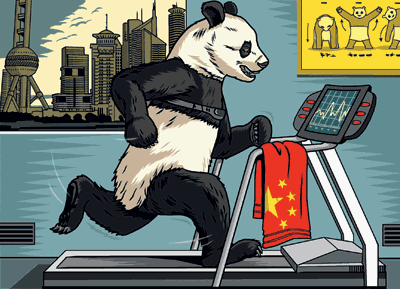
The world has been very nervous about China in the past two months, with a series of weak data prints (lowest quarter industrial sector growth in 20 years at 5.8%, bearish PMI numbers etc) leading to significant falls in the Chinese stock market.
But there are another, completely different set of numbers in China, which markets certainly have not focused on, and it is quite apparent they are booming. We know this from the performance of many Chinese companies following their quarterly earnings, including retail giant Alibaba (up 48% since 26 September) and Baidu (up 41%).
Baidu, which is China’s answer to Google, reported GMV (gross merchandise volume) for transaction services of US$9.5 billion, up 119% on the previous corresponding quarter, with Baidu Wallet active accounts up fivefold to 45 million. Alibaba’s GMV was up 27%, while mobile monthly active users and revenues rose by 59% and 183% respectively.
As anyone who has spent time in China in the past few years knows, there is a major shift from production and goods to consumption and services. It is this shift that has ignited many of the Chinese names (which, courtesy of a more liberal government are now available to investors here). Names such as Baidu, Alibaba and Tencent, but also on-line travel company C-Trip (up 60%) – to say nothing of Apple, which is again performing well as investors decide that September quarter growth for China of 99% maybe isn’t that bad after all.
So while the headline numbers are, well grabbing headlines, the important numbers are telling a very different story. The Economist quoted services sector growth of 8.6% in the September quarter – equalling the strongest growth since 2011. The Caixin-China services PMI jumped to 52 yesterday. As of a few years ago, China’s services sector is now bigger than manufacturing.
We suspect it’s not just about the services story. Xi Jinping and others have been banging on about the need to modernise China’s economy. Some have taken this to mean increasing the number of coal-fired factories. But the smart money always understood that it was about China leapfrogging legacy industries straight into the 21st century. This is the place where the web and the information on it tighten supply chains and so makes every transaction use less (of everything) – which increases productivity.
That’s what Xi is really talking about. It would also help China significantly if these businesses, as well as being important within China, could ultimately expand and become significant globally. Xi wants and needs these companies to succeed. Which is another reason why the China trade has become de-risked in the past few years.
Australia’s $7bn data centre | Harry Morrow features in SBS On the Money
18 Dec 2025Anshu Sharma features on EquityMates Best of the Best Podcast
18 Dec 2025December 2025 Update+
18 Dec 2025‘US Tech Volatility, AI Winners & Top Stock Picks’: Alex Pollak features on EquityMates Talk Money to Me
04 Dec 2025Share this Post

